英语一般将来时专题复习含答案解析
英语一般将来时试题(有答案和解析)含解析
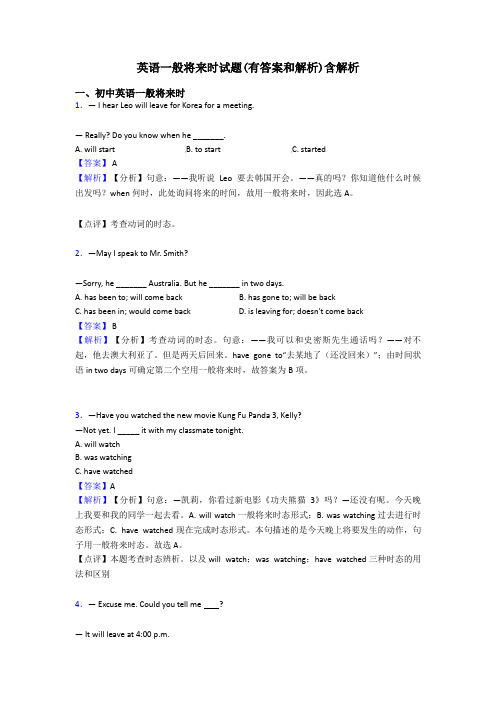
英语一般将来时试题(有答案和解析)含解析一、初中英语一般将来时1.— I hear Leo will leave for Korea for a meeting.— Really? Do you know when he _______.A. will startB. to startC. started【答案】 A【解析】【分析】句意:——我听说Leo要去韩国开会。
——真的吗?你知道他什么时候出发吗?when何时,此处询问将来的时间,故用一般将来时,因此选A。
【点评】考查动词的时态。
2.—May I speak to Mr. Smith?—Sorry, he _______ Australia. But he _______ in two days.A. has been to; will come backB. has gone to; will be backC. has been in; would come backD. is leaving for; doesn't come back【答案】 B【解析】【分析】考查动词的时态。
句意:——我可以和史密斯先生通话吗?——对不起,他去澳大利亚了。
但是两天后回来。
have gone to“去某地了(还没回来)”;由时间状语in two days可确定第二个空用一般将来时,故答案为B项。
3.—Have you watched the new movie Kung Fu Panda 3, Kelly?—Not yet. I _____ it with my classmate tonight.A. will watchB. was watchingC. have watched【答案】A【解析】【分析】句意:—凯莉,你看过新电影《功夫熊猫3》吗?—还没有呢。
今天晚上我要和我的同学一起去看。
A. will watch一般将来时态形式;B. was watching过去进行时态形式;C. have watched现在完成时态形式。
高考英语一般将来时题20套(带答案)及解析
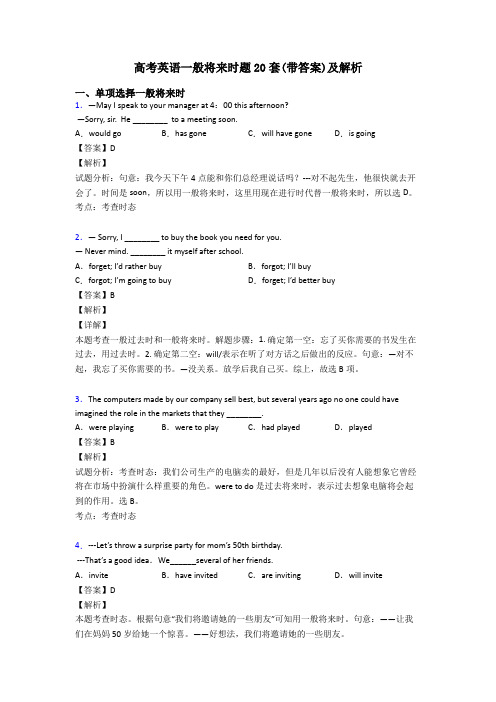
高考英语一般将来时题20套(带答案)及解析一、单项选择一般将来时1.—May I speak to your manager at 4:00 this afternoon?—Sorry, sir. He ________ to a meeting soon.A.would go B.has gone C.will have gone D.is going【答案】D【解析】试题分析:句意:我今天下午4点能和你们总经理说话吗?---对不起先生,他很快就去开会了。
时间是soon,所以用一般将来时,这里用现在进行时代替一般将来时,所以选D。
考点:考查时态2.— Sorry, I ________ to buy the book you need for you.— Never mind. ________ it myself after school.A.forget; I’d rather buy B.forgot; I’ll buyC.forgot; I’m going to buy D.forget; I’d better buy【答案】B【解析】【详解】本题考查一般过去时和一般将来时。
解题步骤:1. 确定第一空:忘了买你需要的书发生在过去,用过去时。
2. 确定第二空:will/表示在听了对方话之后做出的反应。
句意:—对不起,我忘了买你需要的书。
—没关系。
放学后我自己买。
综上,故选B项。
3.The computers made by our company sell best, but several years ago no one could have imagined the role in the markets that they ________.A.were playing B.were to play C.had played D.played【答案】B【解析】试题分析:考查时态:我们公司生产的电脑卖的最好,但是几年以后没有人能想象它曾经将在市场中扮演什么样重要的角色。
英语一般将来时专题练习(及答案)及解析
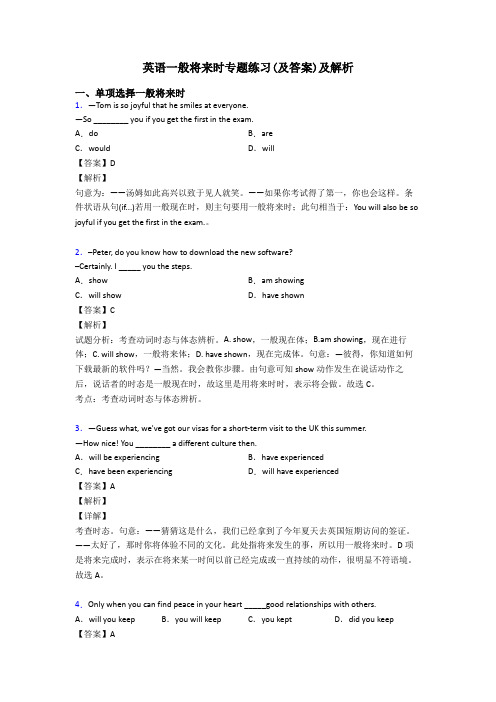
C.would have increasedD.will be increasing
【答案】B
【解析】
试题分析:考查时态。If条件句使用的是一般现在时代替一般将来时,所以主句也是一般将来时,和next year搭配使用。句意:如果我们的营销计划成功,我们明年销售将增加百分之三十。故B正确。
【解析】
句意为:——汤姆如此高兴以致于见人就笑。——如果你考试得了第一,你也会这样。条件状语从句(if...)若用一般现在时,则主句要用一般将来时;此句相当于:You will also be so joyful if you get the first in the exam.。
2.–Peter, do you know how to download the new software?
19.If he ________ exercise, he______ healthy.
A.not; will B.isn’t; won’t be
C.doesn’t; will be D.doesn’t do; won’t be
【答案】D
【解析】
【详解】
考查if条件句中的时态。句意:如果他不做运动,他就不会健康。If条件句,如果主句用一般将来时态,则从句用一般现在时态,且句子主语是he,单数第三人称,故选D。
考点:考查时态
10.It is required that the students _____ mobile phones in their school, so seldom _____ them using one.
A.should not use; you will see
【英语】英语一般将来时题20套(带答案)及解析
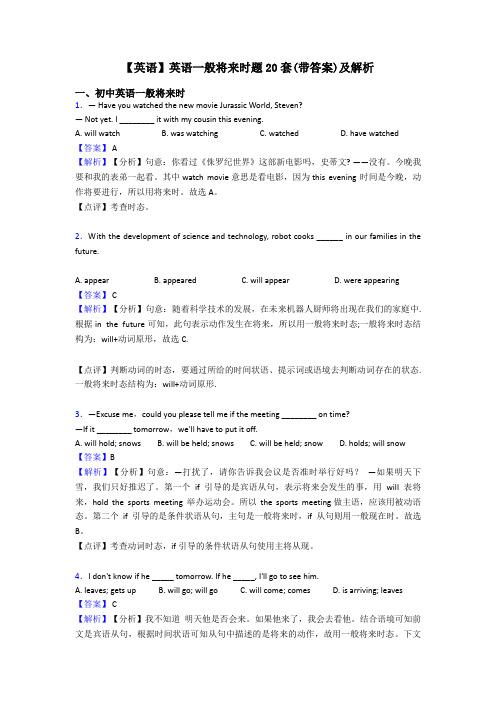
【英语】英语一般将来时题20套(带答案)及解析一、初中英语一般将来时1.— Have you watched the new movie Jurassic World, Steven?— Not yet. I ________ it with my cousin this evening.A. will watchB. was watchingC. watchedD. have watched【答案】 A【解析】【分析】句意:你看过《侏罗纪世界》这部新电影吗,史蒂文? ——没有。
今晚我要和我的表弟一起看。
其中watch movie意思是看电影,因为this evening 时间是今晚,动作将要进行,所以用将来时。
故选A。
【点评】考查时态。
2.With the development of science and technology, robot cooks ______ in our families in the future.A. appearB. appearedC. will appearD. were appearing【答案】 C【解析】【分析】句意:随着科学技术的发展,在未来机器人厨师将出现在我们的家庭中. 根据in the future可知,此句表示动作发生在将来,所以用一般将来时态;一般将来时态结构为:will+动词原形,故选C.【点评】判断动词的时态,要通过所给的时间状语、提示词或语境去判断动词存在的状态. 一般将来时态结构为:will+动词原形.3.—Excuse me,could you please tell me if the meeting ________ on time?—If it ________ tomorrow,we'll have to put it off.A. will hold; snowsB. will be held; snowsC. will be held; snowD. holds; will snow 【答案】B【解析】【分析】句意:—打扰了,请你告诉我会议是否准时举行好吗?—如果明天下雪,我们只好推迟了。
英语一般将来时试题(有答案和解析)含解析

英语一般将来时试题(有答案和解析)含解析一、初中英语一般将来时1.I wonder when they ________ for Beijing. I will go to the train station to see them off when they ________.A. will leave; leaveB. leave; will leaveC. go; leaveD. will go; leave【答案】 A【解析】【分析】句意:我想知道他们什么时候去北京。
当他们离开的时候,我将去车站送他们。
leave for,动身前往,去……。
第一句话是宾语从句,因此从句可以使用一般将来时,第二句是when引导的时间状语从句,应遵循主将从现的原则,因此应使用一般现在时,故答案是A。
【点评】考查动词辨析和时间状语从句中的主将从现原则。
注意识记固定搭配leave for,同时只要记住在时间状语从句中的主将从现原则。
2.With the development of science and technology, robot cooks ______ in our families in the future.A. appearB. appearedC. will appearD. were appearing【答案】 C【解析】【分析】句意:随着科学技术的发展,在未来机器人厨师将出现在我们的家庭中. 根据in the future可知,此句表示动作发生在将来,所以用一般将来时态;一般将来时态结构为:will+动词原形,故选C.【点评】判断动词的时态,要通过所给的时间状语、提示词或语境去判断动词存在的状态. 一般将来时态结构为:will+动词原形.3.— I hear your father has gone to Tokyo on business?— Yes. And he _______ in three weeks.A. has returnedB. will returnC. would returnD. returns【答案】 B【解析】【分析】句意:—我听说你父亲出差去日本了?—是的。
(英语) 英语一般将来时试题(有答案和解析)含解析

(英语)英语一般将来时试题(有答案和解析)含解析一、初中英语一般将来时1.Jack ______ a good rest as soon as he finishes the exam.A. hasB. hadC. is havingD. will have【答案】 D【解析】【分析】句意:Jack一完成他的考试就要好好的休息一下。
has第三人称单数形式;had是have的过去式;is having现在进行时态;will have一般将来时态。
have a rest是固定短语,意思是“休息一下”,句中的as soon as引导的是时间状语从句,从句中用一般现在时态,主句用一般将来时态,故答案选D。
【点评】考查一般将来时态。
2.— I hear your father has gone to Tokyo on business?— Yes. And he _______ in three weeks.A. has returnedB. will returnC. would returnD. returns【答案】 B【解析】【分析】句意:—我听说你父亲出差去日本了?—是的。
他将在三周后回来。
时间状语in three weeks与一般将来时连用,故选B。
3.I don't know whether mom _________ me to Beijing next week.A. takeB. takesC. will takeD. would take【答案】 C【解析】【分析】句意:我不知道妈妈下周是否会带我去北京。
分析句子结构可知,此处是宾语从句,主句时态为一般现在时,从句时态根据主现从任原则,再根据从句中的next week可知,从句应该是表示将来的动作,所以用一般将来时,用will do形式,故选C。
【点评】考查宾语从句时态。
注意宾语从句时态的主现从任原则。
4.If you want to visit the Palace Museum, I ________ tickets for you tomorrow.A. will bookB. bookedC. have bookedD. was booking【答案】 A【解析】【分析】句意:如果你想参观故宫博物馆,我明天给你订票。
(英语)英语一般将来时专题训练答案及解析

(英语)英语一般将来时专题训练答案及解析一、初中英语一般将来时1.Mr. Smith our school next year.A. will visitB. visitsC. was visitingD. visited【答案】 A【解析】【分析】句意:史密斯先生下一年将参观我们的学校。
根据时间状语next year判断,时态为一般将来时态,故答案为A。
【点评】考查动词时态,本题涉及一般将来时的应用,表示在将来某个时间将要发生的动作或存在的状态。
2.I’m so lucky because I see more cartoon characters next month.A. is able toB. will be able toC. be able toD. was able to【答案】B【解析】【分析】句意:我真幸运因为我下个月能看到更多的卡通人物。
next month表将来,因此用will be able to。
故选B。
【点评】考查一般将来时。
3.—Have you watched the new movie Kung Fu Panda 3, Kelly?—Not yet. I _____ it with my classmate tonight.A. will watchB. was watchingC. have watched【答案】A【解析】【分析】句意:—凯莉,你看过新电影《功夫熊猫3》吗?—还没有呢。
今天晚上我要和我的同学一起去看。
A. will watch一般将来时态形式;B. was watching过去进行时态形式;C. have watched现在完成时态形式。
本句描述的是今天晚上将要发生的动作,句子用一般将来时态。
故选A。
【点评】本题考查时态辨析。
以及will watch;was watching;have watched三种时态的用法和区别4.Look on the bright side of life,and imagine that you ______ a happy and successful future.A. hadB. will haveC. haveD. have had【答案】 B【解析】【分析】考查时态.句意"看看生活中美好的一面,想象你会有一个幸福和成功的未来.".A过去时.B一般将来时态.C动词原形.D现在完成时态.结合语境"看看生活中美好的一面,想象你___一个幸福和成功的未来.",由future未来,可知,表示将来,用一般将来时态.答案是B.5.— There ________a football match on TV tonight. I can't wait to watch it.— Me, too. It's ________ Guangzhou Evergrande and the Australian team Melbourne Victory.A. will be; betweenB. will be; bothC. will have; betweenD. will have; both【答案】A【解析】【分析】句意为:---今晚将有一场电视直播足球比赛,我非常想看。
(英语)英语一般将来时专项习题及答案解析

(英语)英语一般将来时专项习题及答案解析一、初中英语一般将来时1.If our government attention to controlling food safety now, our health ________ in danger.A. won't pay; isB. doesn't pay; isC. won't pay; will beD. doesn't pay; will be【答案】 D【解析】【分析】句意:如果我们的政府现在不注意控制食品安全,我们的健康就会出于危险之中。
结合语境可知本句主语描述的是将来某时进行的动作,故用一般将来时态。
当主句描述将来时态,条件状语从句中用一般现在时态表示将来动作,结合语境可知选D。
【点评】英语中的时态主要是借助于时间状语与上下文语境来进行判断。
解答此类题型,首先要注意句子中的时间状语,如果没有则要通过分析上下文,结合语境来判断句子的时态。
英语疑问句中一般具有时态上的对应关系,注意结合这一特点进行区分。
英语状语从句的时态与主句有比较紧密的联系,若主句为一般将来时,时间和条件状语从句通常要用一般现在时表示将来,而不能直接使用将来时态。
2.I’m so lucky because I see more cartoon characters next month.A. is able toB. will be able toC. be able toD. was able to【答案】B【解析】【分析】句意:我真幸运因为我下个月能看到更多的卡通人物。
next month表将来,因此用will be able to。
故选B。
【点评】考查一般将来时。
3.— Excuse me. Could you tell me ?— It will leave at 4:00 p.m.A. how will you go to ShanghaiB. how you will go to ShanghaiC. when the bus would leave for ShanghaiD. when the bus will leave for Shanghai【答案】 D【解析】【分析】这是一道根据回答写出问句所缺成分的题目,阅题时要仔细分析回答的句子。
(英语)英语一般将来时专项含解析
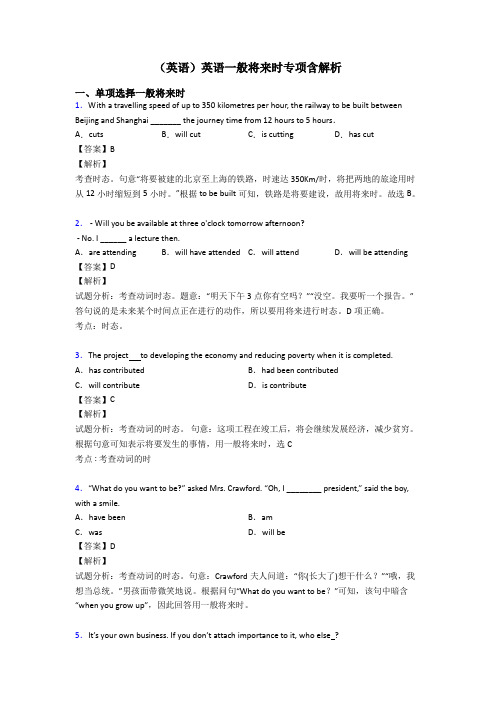
(英语)英语一般将来时专项含解析一、单项选择一般将来时1.With a travelling speed of up to 350 kilometres per hour, the railway to be built between Beijing and Shanghai _______ the journey time from 12 hours to 5 hours.A.cuts B.will cut C.is cutting D.has cut【答案】B【解析】考查时态。
句意“将要被建的北京至上海的铁路,时速达350Km/时,将把两地的旅途用时从12小时缩短到5小时。
”根据to be built可知,铁路是将要建设,故用将来时。
故选B。
2. - Will you be available at three o'clock tomorrow afternoon?- No. I ______ a lecture then.A.are attending B.will have attended C.will attend D.will be attending 【答案】D【解析】试题分析:考查动词时态。
题意:“明天下午3点你有空吗?”“没空。
我要听一个报告。
”答句说的是未来某个时间点正在进行的动作,所以要用将来进行时态。
D项正确。
考点:时态。
3.The project to developing the economy and reducing poverty when it is completed. A.has contributed B.had been contributedC.will contribute D.is contribute【答案】C【解析】试题分析:考查动词的时态。
句意:这项工程在竣工后,将会继续发展经济,减少贫穷。
根据句意可知表示将要发生的事情,用一般将来时,选C考点 : 考查动词的时4.“What do you want to be?” asked Mrs. Crawford. “Oh, I ________ president,” said the boy, with a smile.A.have been B.amC.was D.will be【答案】D【解析】试题分析:考查动词的时态。
(英语) 英语一般将来时专题练习(及答案)含解析
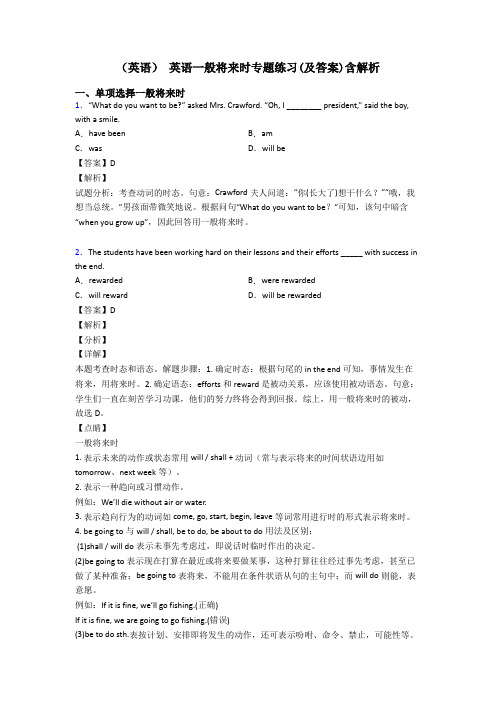
(英语)英语一般将来时专题练习(及答案)含解析一、单项选择一般将来时1.“What do you want to be?” asked Mrs. Crawford. “Oh, I ________ president,” said the boy, with a smile.A.have been B.amC.was D.will be【答案】D【解析】试题分析:考查动词的时态。
句意:Crawford夫人问道:“你(长大了)想干什么?”“哦,我想当总统。
”男孩面带微笑地说。
根据问句“Wha t do you want to be?”可知,该句中暗含“when you grow up”,因此回答用一般将来时。
2.The students have been working hard on their lessons and their efforts _____ with success in the end.A.rewarded B.were rewardedC.will reward D.will be rewarded【答案】D【解析】【分析】【详解】本题考查时态和语态。
解题步骤:1. 确定时态:根据句尾的in the end可知,事情发生在将来,用将来时。
2. 确定语态:efforts和reward是被动关系,应该使用被动语态。
句意:学生们一直在刻苦学习功课,他们的努力终将会得到回报。
综上,用一般将来时的被动,故选D。
【点睛】一般将来时1. 表示未来的动作或状态常用will / shall + 动词(常与表示将来的时间状语边用如tomorrow、next week等)。
2. 表示一种趋向或习惯动作。
例如:We’ll die without air or wate r.3. 表示趋向行为的动词如come, go, start, begin, leave等词常用进行时的形式表示将来时。
4. be going to与will / shall, be to do, be about to do用法及区别:(1)shall / will do表示未事先考虑过,即说话时临时作出的决定。
【英语】英语一般将来时专题训练答案含解析

【英语】英语一般将来时专题训练答案含解析一、初中英语一般将来时1.—What is your plan for next weekend, Lingling?—I volunteer work in the museum.A. was doingB. didC. have doneD. am going to do【答案】 D【解析】【分析】句意:——玲玲,你下周末打算干什么?——我要去博物馆做义工。
根据题干中的next weekend,可知此句要用一般将来时,故选D。
【点评】考查一般将来时的基本构成及用法。
2.I’m so lucky because I see more cartoon characters next month.A. is able toB. will be able toC. be able toD. was able to【答案】B【解析】【分析】句意:我真幸运因为我下个月能看到更多的卡通人物。
next month表将来,因此用will be able to。
故选B。
【点评】考查一般将来时。
3.—Do you know when Mrs. White for dinner this evening?—No, but I think she when she is free.A. will come; will comeB. will come; comesC. comes; will come【答案】 A【解析】【分析】句意:——你知道怀特太太今晚是否来吃晚饭吗?——不知道。
但我认为如果她有空,她会来。
空一,句子为含有宾语从句的主从复合句,主句是一般现在时,从句用它所需要的任何时态,根据this evening今晚,可知句子为一般将来时,will come;空二,回答是when引导的时间状语从句,从句是一般现在时,主句应用将来时,will come,故选A。
【点评】此题考查从句的时态。
【英语】一般将来时专项练习及答案详解
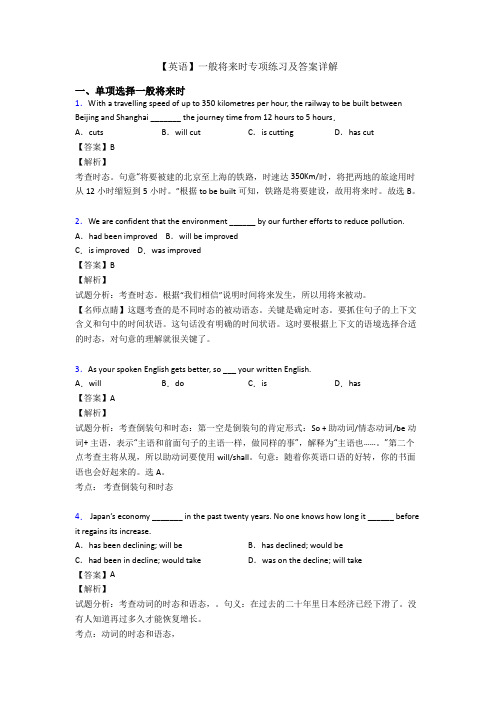
【英语】一般将来时专项练习及答案详解一、单项选择一般将来时1.With a travelling speed of up to 350 kilometres per hour, the railway to be built between Beijing and Shanghai _______ the journey time from 12 hours to 5 hours.A.cuts B.will cut C.is cutting D.has cut【答案】B【解析】考查时态。
句意“将要被建的北京至上海的铁路,时速达350Km/时,将把两地的旅途用时从12小时缩短到5小时。
”根据to be built可知,铁路是将要建设,故用将来时。
故选B。
2.We are confident that the environment ______ by our further efforts to reduce pollution. A.had been improved B.will be improvedC.is improved D.was improved【答案】B【解析】试题分析:考查时态。
根据“我们相信”说明时间将来发生,所以用将来被动。
【名师点睛】这题考查的是不同时态的被动语态。
关键是确定时态。
要抓住句子的上下文含义和句中的时间状语。
这句话没有明确的时间状语。
这时要根据上下文的语境选择合适的时态,对句意的理解就很关键了。
3.As your spoken English gets better, so ___ your written English.A.will B.do C.is D.has【答案】A【解析】试题分析:考查倒装句和时态:第一空是倒装句的肯定形式:So + 助动词/情态动词/be动词+ 主语,表示“主语和前面句子的主语一样,做同样的事”,解释为“主语也……。
”第二个点考查主将从现,所以助动词要使用will/shall。
(英语)英语一般将来时专项训练及答案及解析
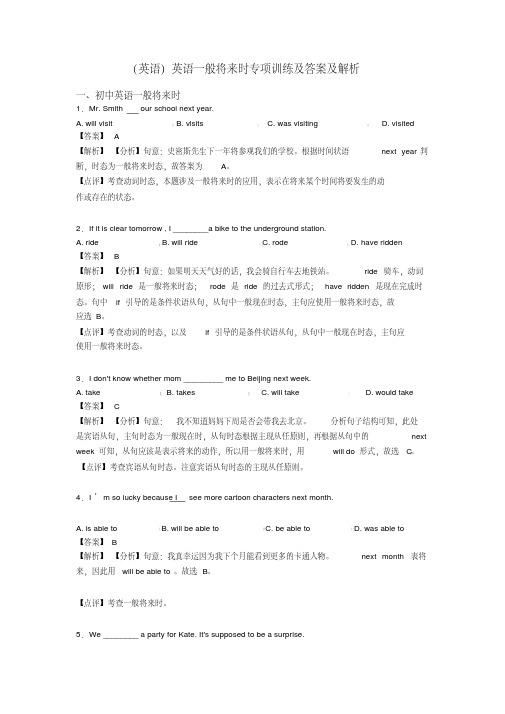
(英语)英语一般将来时专项训练及答案及解析一、初中英语一般将来时1.Mr. Smith our school next year.A. will visitB. visitsC. was visitingD. visited 【答案】 A【解析】【分析】句意:史密斯先生下一年将参观我们的学校。
根据时间状语next year判断,时态为一般将来时态,故答案为A。
【点评】考查动词时态,本题涉及一般将来时的应用,表示在将来某个时间将要发生的动作或存在的状态。
2.If it is clear tomorrow , I ________a bike to the underground station.A. rideB. will rideC. rodeD. have ridden【答案】 B【解析】【分析】句意:如果明天天气好的话,我会骑自行车去地铁站。
ride骑车,动词原形;will ride是一般将来时态;rode是ride的过去式形式;have ridden是现在完成时态。
句中if引导的是条件状语从句,从句中一般现在时态,主句应使用一般将来时态,故应选B。
【点评】考查动词的时态,以及if引导的是条件状语从句,从句中一般现在时态,主句应使用一般将来时态。
3.I don't know whether mom _________ me to Beijing next week.A. takeB. takesC. will takeD. would take 【答案】 C【解析】【分析】句意:我不知道妈妈下周是否会带我去北京。
分析句子结构可知,此处是宾语从句,主句时态为一般现在时,从句时态根据主现从任原则,再根据从句中的next week可知,从句应该是表示将来的动作,所以用一般将来时,用will do形式,故选C。
【点评】考查宾语从句时态。
注意宾语从句时态的主现从任原则。
4.I’m so lucky because Isee more cartoon characters next month.A. is able toB. will be able toC. be able toD. was able to【答案】B【解析】【分析】句意:我真幸运因为我下个月能看到更多的卡通人物。
【英语】 英语一般将来时专题练习(及答案)含解析
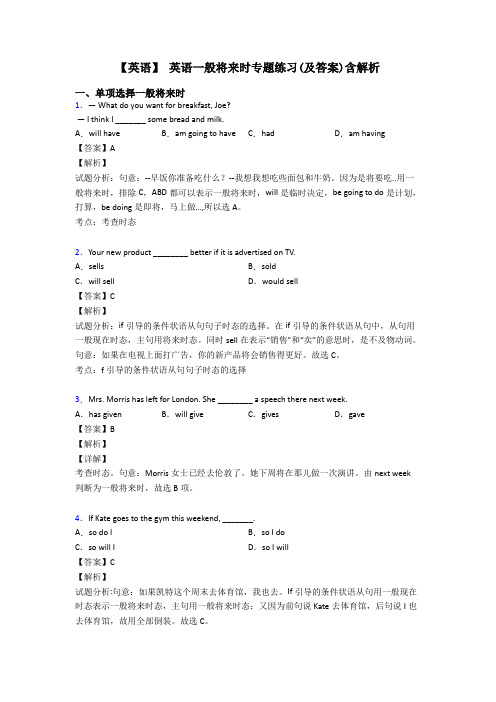
【英语】英语一般将来时专题练习(及答案)含解析一、单项选择一般将来时1.— What do you want for breakfast, Joe?— I think I _______ some bread and milk.A.will have B.am going to have C.had D.am having【答案】A【解析】试题分析:句意:--早饭你准备吃什么?--我想我想吃些面包和牛奶。
因为是将要吃..用一般将来时,排除C,ABD都可以表示一般将来时,will是临时决定,be going to do是计划,打算,be doing是即将,马上做…,所以选A。
考点:考查时态2.Your new product ________ better if it is advertised on TV.A.sells B.soldC.will sell D.would sell【答案】C【解析】试题分析:if引导的条件状语从句句子时态的选择。
在if引导的条件状语从句中,从句用一般现在时态,主句用将来时态。
同时sell在表示“销售”和“卖”的意思时,是不及物动词。
句意:如果在电视上面打广告,你的新产品将会销售得更好。
故选C。
考点:f引导的条件状语从句句子时态的选择3.Mrs. Morris has left for London. She ________ a speech there next week.A.has given B.will give C.gives D.gave【答案】B【解析】【详解】考查时态。
句意:Morris女士已经去伦敦了。
她下周将在那儿做一次演讲。
由next week判断为一般将来时,故选B项。
4.If Kate goes to the gym this weekend, _______.A.so do I B.so I doC.so will I D.so I will【答案】C【解析】试题分析:句意:如果凯特这个周末去体育馆,我也去。
英语一般将来时专项含解析
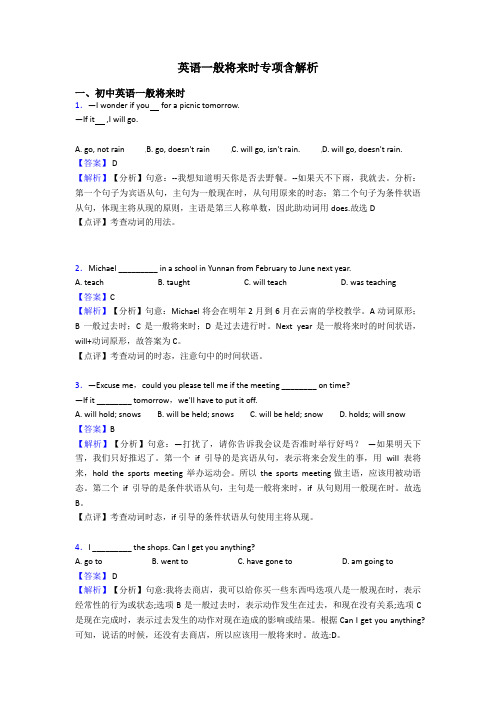
英语一般将来时专项含解析一、初中英语一般将来时1.—I wonder if you for a picnic tomorrow.—If it ,I will go.A. go, not rainB. go, doesn't rainC. will go, isn't rain.D. will go, doesn't rain.【答案】 D【解析】【分析】句意:--我想知道明天你是否去野餐。
--如果天不下雨,我就去。
分析:第一个句子为宾语从句,主句为一般现在时,从句用原来的时态;第二个句子为条件状语从句,体现主将从现的原则,主语是第三人称单数,因此助动词用does.故选D【点评】考查动词的用法。
2.Michael _________ in a school in Yunnan from February to June next year.A. teachB. taughtC. will teachD. was teaching【答案】C【解析】【分析】句意:Michael将会在明年2月到6月在云南的学校教学。
A动词原形;B一般过去时;C是一般将来时;D是过去进行时。
Next year是一般将来时的时间状语,will+动词原形,故答案为C。
【点评】考查动词的时态,注意句中的时间状语。
3.—Excuse me,could you please tell me if the meeting ________ on time?—If it ________ tomorrow,we'll have to put it off.A. will hold; snowsB. will be held; snowsC. will be held; snowD. holds; will snow【答案】B【解析】【分析】句意:—打扰了,请你告诉我会议是否准时举行好吗?—如果明天下雪,我们只好推迟了。
- 1、下载文档前请自行甄别文档内容的完整性,平台不提供额外的编辑、内容补充、找答案等附加服务。
- 2、"仅部分预览"的文档,不可在线预览部分如存在完整性等问题,可反馈申请退款(可完整预览的文档不适用该条件!)。
- 3、如文档侵犯您的权益,请联系客服反馈,我们会尽快为您处理(人工客服工作时间:9:00-18:30)。
英语一般将来时专题复习含答案解析一、初中英语一般将来时1.—Have you watched the new movie Kung Fu Panda 3, Kelly?—Not yet. I________it with my classmate tonight.A. will watchB. was watchingC. have watched【答案】 A【解析】【分析】句意:---你看了新电影《功夫熊猫3》了吗,凯利?---还没有,我今天晚上和同学去看。
A是一般将来时;B是过去进行时;C是现在完成时。
由not yet可知此处动作尚未发生,可排除BC;另外tonight是将来时间,所以用一般将来时。
故答案为A。
【点评】考查动词的时态,注意上下文的暗示词。
2.—May I speak to Mr. Smith?—Sorry, he _______ Australia. But he _______ in two days.A. has been to; will come backB. has gone to; will be backC. has been in; would come backD. is leaving for; doesn't come back【答案】 B【解析】【分析】考查动词的时态。
句意:——我可以和史密斯先生通话吗?——对不起,他去澳大利亚了。
但是两天后回来。
have gone to“去某地了(还没回来)”;由时间状语in two days可确定第二个空用一般将来时,故答案为B项。
3.I don't know if my brother _____________ here tomorrow. If he _____________, I'll call you.A. comes; comesB. will come; comesC. comes; will comeD. will come; will come【答案】 B【解析】【分析】句意:我不知道是否我哥哥明天将来,如果他来,我将给你打电话。
第一个句子中if意思是是否,tomorrow表明时态是一般将来时,所以用will come;第二个句子中if 意思是如果,引导条件状语从句,从句用一般现在时,主句用will+动词原形,句子是从句,所以用一般现在时,主语是he,所以用comes,故选B。
【点评】考查一般将来时和条件状语从句,注意平时识记if的用法,理解句意。
4.—I've never seen Mr. Taylor before.—Don't worry. I ______ him to you before the meeting.A. will introduceB. introducedC. have introducedD. had introduced【答案】 A【解析】【分析】句意:——我以前从没见过泰勒先生。
别担心。
开会前我会把他介绍给你。
根据上句 I've never seen Mr. Taylor before. 到现在为止没有见过他,所以才有开会前介绍给你。
要用一般将来时,will+动词原形。
故选A。
【点评】考查一般将来时的构成和用法。
注意根据语境确定动词的时态。
5.I wonder when they ________ for Beijing. I will go to the train station to see them off when they ________.A. will leave; leaveB. leave; will leaveC. go; leaveD. will go; leave【答案】 A【解析】【分析】句意:我想知道他们什么时候去北京。
当他们离开的时候,我将去车站送他们。
leave for,动身前往,去……。
第一句话是宾语从句,因此从句可以使用一般将来时,第二句是when引导的时间状语从句,应遵循主将从现的原则,因此应使用一般现在时,故答案是A。
【点评】考查动词辨析和时间状语从句中的主将从现原则。
注意识记固定搭配leave for,同时只要记住在时间状语从句中的主将从现原则。
6.—What is your plan for next weekend, Lingling?—I volunteer work in the museum.A. was doingB. didC. have doneD. am going to do【答案】 D【解析】【分析】句意:——玲玲,你下周末打算干什么?——我要去博物馆做义工。
根据题干中的next weekend,可知此句要用一般将来时,故选D。
【点评】考查一般将来时的基本构成及用法。
7.Hold your dream,_____ you might regret some day.A. andB. orC. butD. so【答案】 B【解析】【分析】考查连词.句意:坚持你的梦想,___有一天你会后悔的。
A和,表示并列关系,B否则、或者,C但是,表示转折关系,D所以,表示因果关系。
结合语境可知,用or否则,选B.8.— Do you know when he tomorrow?— Don't worry. I think as soon as he , he will give you a call.A. will come; will comeB. will come; comesC. comes; will comeD. comes; comes 【答案】 B【解析】【分析】这是一道考查一般将来时以及as soon as 结构使用的题目。
句意:你知道他明天什么时候来吗?不用担心,我认为他来了,他会给你打电话的。
由tomorrow知第一句为一般将来时,故第一个空填will come 形式;as soon as 引导时间状语从句,主句用一般将来时,从句用一般现在时表一般将来时,故第二个空填comes。
故选B。
【点评】本题考查一般将来时,以及as soon as结构的用法,在平时学习中要充分掌握时态,以及常见的引导时间状语从句的短语的用法。
9.—Tom wants to know if you ________ a picnic next Sunday.—Yes. But if it ________, we'll visit the museum instead.A. will have; will rainB. have; rainsC. have; will rainD. will have; rains【答案】D【解析】【分析】句意:汤姆想知道下周日你们是否去野炊。
是的,但是如果下雨的话,我们将改去参观博物馆。
if引导宾语从句时,意为“是否”,句子时态根据句意选用,if 作为“假如”时,引导的是条件状语从句,主句用一般将来时,从句用一般现在时表示将来,故选D【点评】此考点也是中考最喜欢出现的考点,if除了可以引导条件状语从句外,还可以引导宾语从句,翻译成“是否”。
引导宾语从句时没有“主将从现”的说法。
除了if外,还有when, as soon as也一样要注意“主将从现”。
10.—You'd better take an umbrella. The weather report says it in the afternoon.— Thank you. I will put one in my bag.A. will rainB. rainsC. is raining【答案】 A【解析】【分析】句意:——你最好带把伞。
天气预报说是下午要下雨。
——谢谢你。
我会在包里放一个。
A一般将来时,B一般现在时,C现在进行时,根据 in the afternoon和 I will put one in my bag 可知时态是一般将来时,故选A。
【点评】考查时态,注意一般将来时的用法。
11.Robots more heavy work for us in the future.A. will doB. didC. have doneD. were doing【答案】A【解析】【分析】句意:在将来, 机器人将为我们做更多繁重的工作。
根据in the future 可知此处用一般将来时, 故选A。
【点评】一般将来时12.Could you tell me____?A. when will they leave BeijingB. when would they leave BeijingC. when they will leave BeijingD. when they would leave Beijing【答案】 C【解析】【分析】句意:你能告诉我他们什么时候离开北京吗?这是含有宾语从句的主从复合句。
从句用陈述语序,疑问词+主语+谓语,故排除A B;主句中的could表示语气的委婉,不是过去时。
根据句意,从句用一般将来时。
故选C。
【点评】此题考查宾语从句。
注意从的语序和时态。
13.If you want to visit the Palace Museum, I ________ tickets for you tomorrow.A. will bookB. bookedC. have bookedD. was booking【答案】 A【解析】【分析】句意:如果你想参观故宫博物馆,我明天给你订票。
book,订购,A.一般将来时;B.一般过去时;C.现在完成时;D.过去进行时。
根据tomorrow,可知动词用一般将来时,故选A。
【点评】考查动词的时态,注意一般将来时的用法。
14.I _________ the shops. Can I get you anything?A. go toB. went toC. have gone toD. am going to【答案】 D【解析】【分析】句意:我将去商店,我可以给你买一些东西吗迭项八是一般现在时,表示经常性的行为或状态;选项B是一般过去时,表示动作发生在过去,和现在没有关系;选项C 是现在完成时,表示过去发生的动作对现在造成的影响或结果。
根据Can I get you anything?可知,说话的时候,还没有去商店,所以应该用一般将来时。
故选:D。
15.— Excuse me. Could you tell me ?— It will leave at 4:00 p.m.A. how will you go to ShanghaiB. how you will go to ShanghaiC. when the bus would leave for ShanghaiD. when the bus will leave for Shanghai【答案】 D【解析】【分析】这是一道根据回答写出问句所缺成分的题目,阅题时要仔细分析回答的句子。
